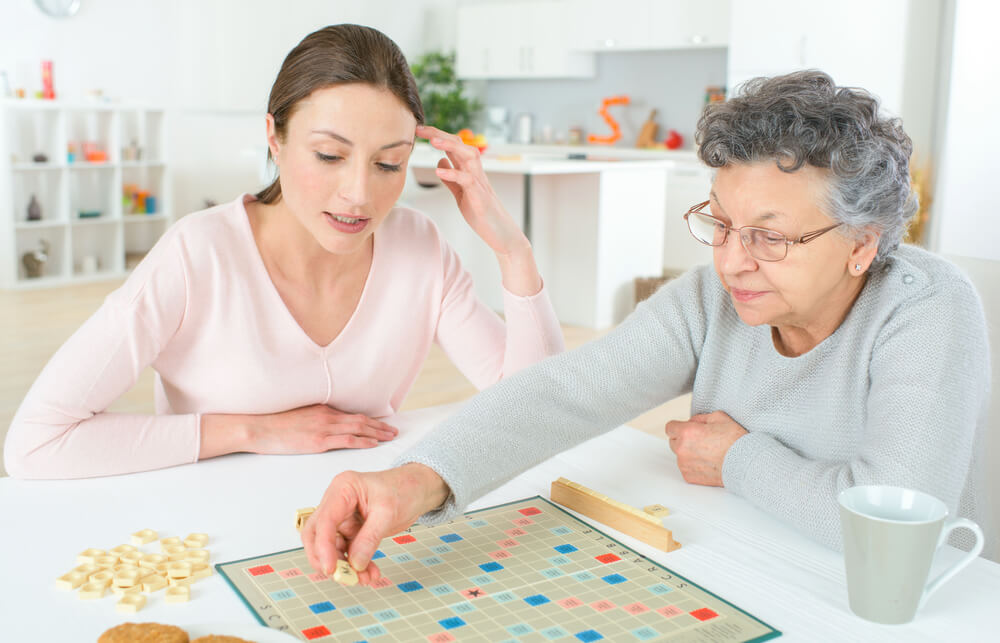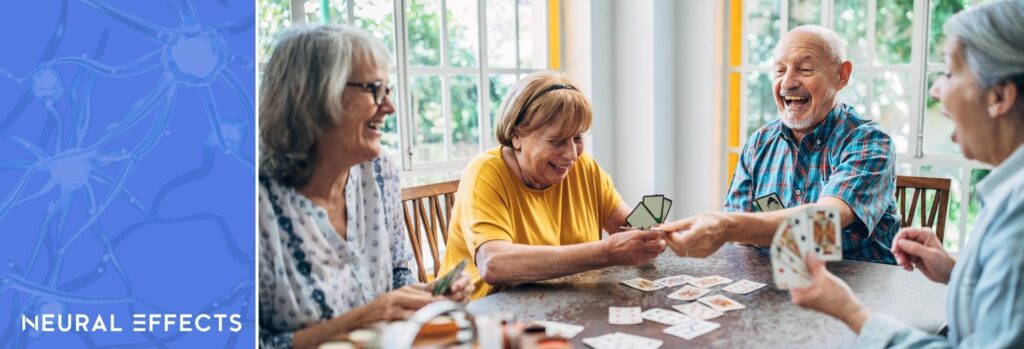If you’re experiencing memory lapses, memory exercises are a good way to boost your brain health and slow down cognitive decline.
There’s no shortage of games and activities suggested for older adults who are concerned about dementia. But it can be difficult to separate which ones are designed specifically to help with your memory and which ones are just brain exercises that may (or may not) help you recall information.
In this article, we share with you some of the memory exercises our own therapists use in therapy regimens with patients specifically to address memory problems. Each exercise is explained step-by-step so you can do them all at home.
In addition, we explain other key ways you can address cognitive decline and dementia. We cover:
- Why memory exercises help dementia patients
- Seven memory exercises taken from therapy
- Dementia treatment at Neural Effects
- More activities & lifestyle habits you can pursue at home to slow down cognitive decline
Neural Effects uses the latest evidence-based techniques to diagnose and help dementia patients. We are located in Provo, Utah and serve anyone in Salt Lake County or the Utah County area. We are in network for most types of medical insurance. Schedule your evaluation today.
Can Memory Exercises for Dementia Actually Make a Difference?

Multiple studies and clinical trials show that patients who consistently practice memory activities experience improvements in their memory and find it easier to perform their daily activities. This includes patients with Alzheimer’s disease, vascular dementia, and other forms of dementia. These exercises by themselves aren’t a cure, but they can improve your well-being and quality of life. Memory exercises…
- Challenge the brain: Memory exercises stimulate different aspects of your memory, including short-term and long-term memory. They are a way to “exercise” and keep your brain active — just as you exercise your body to keep it fit.
- Promote an active social life: Memory games offer an excellent opportunity to engage with friends and family. What’s more, socializing itself can help your memory. You need to be able to remember your friends’ names, follow the conversation, and play the game at the same time.
- Offer a sense of control: Memory games can help restore a sense of purpose and control. Dementia can lead to feelings of helplessness and even mental health problems, such as depression and anxiety. Engaging in cognitive training helps you take some control back over your situation and contributes to whatever improvement is possible for you.
It’s important to note that memory exercises are only effective if you are actively involved. The key is to keep it challenging and interesting to stimulate mental exercise, but not so difficult that you get frustrated and give up easily. In contrast, activities that are more passive — such as watching TV — may give you some mental stimulation, but there’s no back-and-forth engagement, so it is unlikely to help with memory or other cognitive abilities.
When you start with memory and brain training exercises, it’s best to start with easy levels and gradually increase the difficulty as you get better. Start with short periods, such as 20-30 minutes a day, to avoid mental fatigue.
In addition, it’s important to vary the kinds of memory games in order to train different aspects of your cognition and avoid getting bored. Make sure you track your progress and celebrate even small achievements to reinforce your learning and memory.
Seven Memory Exercises from Therapy You Can Do at Home
Here are seven of the memory exercises our therapists routinely use with patients at Neural Effects to stimulate mental activity. They’re easy to do at home and don’t require specialized equipment. (The most you’ll need is a deck of playing cards.) You’ll need a game partner to help you if you get stuck and to confirm if you’ve correctly finished the exercise.
We’ve divided the exercises into three topics: recall, sequence, and matching.
Recall Exercises
These exercises involve remembering a list of items, numbers, or facts. Essentially, it’s the activity of recalling information after you commit it to memory.
- Grocery list exercise: Memorize part of your grocery list (5-10 items) and then shop for those items without checking the list. Try to remember not only the items on the list (which helps working memory), but also which aisle in the supermarket has those items (helps visual/spatial memory).
- Memory words: Memorize four words at the beginning of the day, then try to recall them later. If you are unable to recall the words, have your game partner give them again, and try to recall them the next day. If you can recall all four words, add an additional four words, and then try to recall all eight words the next day.
- Reverse sentences: Repeat a three- to four-word-long sentence in reverse order. For example, if your game partner says, “I love summer,” then you’ll need to repeat it in reverse: “Summer love I.”
- General recall exercises: Recalling information can be done with anything. For example, if you watch the news in the morning, try to remember 3-5 facts from it, and then recall those facts later in the day. If you’re reading a book, try to summarize what was happening in the story before continuing reading again. Similarly, if you’re watching a TV series or movie, try to remember what happened in the previous episodes or what was happening in the story before continuing to watch. If you meet up with a friend, try to notice 4-5 things about them and recall that information later. It can be anything from what they’re wearing to something they said.
Sequence Exercises
Sequence exercises require you to memorize and repeat a sequence or a pattern. This could include such things as words, sounds, colors, or even movements. As an added challenge, you might be asked to predict what’s coming up next.
- Card sorting: For this card game, you’ll need a deck of cards. Place the aces side by side in a line in a random order. Memorize the order of the suits (e.g., diamond, club, heart, spade) and then flip the aces upside down in the same order. Take a card at a time from the deck and place it in a pile according to its suit (doing your best to remember where each suit is). Continue until you have the whole deck sorted into the four suits. If sorting by suit is too hard, sort the cards by red and black.
- A-Z list: Choose a category and create a list of items A-Z to memorize as you go. For example, for an A-Z list of animals, one player begins by saying an animal that begins with “A”, such as “Alligator”. Then, the next player repeats the list and adds an animal for the next letter, such as “Alligator, Bear,” and then, “Alligator, Bear, Cat,” and so forth.
Matching Exercises
Matching exercises require patients to find pairs of items that are identical or related, such as cards, images, or words.
- Memory match: Use a deck of cards or a memory match card deck to play a game called memory match. Place all the cards upside down in a random order, and then flip two cards over at a time. If they match, you can leave them face up. If they don’t, try again with a new pair. Keep going until you’ve revealed all the cards.
More Than Just Memory Exercises: Treatment at Neural Effects

If you’re experiencing additional dementia symptoms, such as difficulty concentrating and behavior changes, you may need more than just a few memory exercises to help delay further cognitive decline.
At Neural Effects, our dementia clinic, we offer a treatment program called EMPOWER, which combines cognitive stimulation therapy (CST) for dementia and physical exercise to help delay the progression of symptoms. Our treatment doesn’t just address memory loss; it looks at dementia as a whole.
Our treatment includes 14 sessions; they run twice a week for seven weeks. Sessions typically start with 10-15 minutes of aerobic exercise done on a treadmill or stationary bike. Our therapists understand how to adapt this physical activity to what patients can do without serious risk of injury.
Physical exercise is a key part of treatment. Research shows that exercise promotes blood flow everywhere in the body, including the brain. More blood means more energy and oxygen, which helps brain cells perform better. It also triggers the release of a specialized protein called brain-derived neurotrophic factor (BDNF), which in turn encourages the formation and storage of memories, enhances learning, and boosts overall cognitive performance.
After exercise, patients start their cognitive stimulation therapy (CST) session. This includes activities to stimulate cognitive skills, such as word games, puzzles, creative activities, and practical activities. Two trained facilitators work with a group of six patients to help them stay focused and engaged.
We’ve written in more detail about how CST sessions can benefit dementia patients and how to find CST near you.
If our therapists think patients would benefit from additional therapy, we refer them to the appropriate healthcare providers, such as ear, nose and throat (ENT) doctors, occupational therapists, or psychologists.
As part of the EMPOWER program, we also help the families of those who have dementia. Your family members are invited to attend your first session to learn about cognitive stimulation therapy (CST) and repeat the exercises at home. We also educate caregivers about how to live with a dementia patient and suggest community resources, support groups, and other support services both for the patients and their caregivers.
Neural Effects uses the latest evidence-based techniques to diagnose and help dementia patients. We are located in Provo, Utah and serve anyone in Salt Lake County or the Utah County area. We are in network for most types of medical insurance. Schedule your evaluation today.
Other Activities You Can Do at Home

In addition to the exercises explained above, there are many other activities that you can do at home to help with dementia. Some activities described below are not necessarily aimed at improving memory, but they can be useful to improve brain function when combined with a variety of different games and exercises.
Play Games and Puzzles
There are many different types of brain games and puzzles that can help improve your memory. Playing just one game occasionally is unlikely to provide any benefit; the aim is to engage in a variety of different games to help with different aspects of your memory. A few examples include:
- Crossword puzzles: Studies show that completing crosswords and other word puzzles on a regular basis delays the onset of memory decline in patients with dementia.
- Jigsaw puzzles: Completing puzzles is a good way to pass the time and also benefits the brain. There’s strong evidence that puzzles improve memory and other cognitive functions, such as perception and reasoning.
- Sudoku: Studies show that number puzzles such as sudoku can improve short-term working memory and other cognitive functions.
- Board games: Playing board games regularly slows down cognitive decline, especially memory loss. It also helps other cognitive skills, including language, problem-solving, and reasoning. There are many options on the market, from older games (Monopoly, Scrabble, Parcheesi, etc.) to trivia games (Jeopardy!, Trivial Pursuit, etc.) to ancient strategy games (Chess, Go, etc.) to modern strategy games (Settlers of Catan, Ticket to Ride, Wingspan, etc.). Since most games are played with family or friends, it’s a great opportunity to socialize while you flex your mental muscles.
Learn a New Skill
Learning a new skill is another way to engage your brain. Anything that requires you to fully engage in an activity and learn something new can help improve your memory. If it’s something you’re already good at, it’s not a good memory exercise. The activity needs to be something that takes you slightly out of your comfort zone. Ideally, it needs to be something that is easy to begin with and gradually gets more difficult as your skills improve. When you feel comfortable at a level, it’s time to make it more challenging.
- Learn a new language: Understanding two languages not only makes it easier to travel abroad but also supports a healthy brain. Studies show that learning a new language improves short-term memory and word recall, even if patients start learning later in life.
- Learn to play a musical instrument: Playing a musical instrument requires a mix of physical and cognitive functions (for example, reading music while playing the instrument or playing from memory). Evidence shows that taking music lessons improves memory and verbal fluency in dementia patients.
- Find a new hobby: It can be anything from photography or painting to knitting or pottery. A study found that patients who engaged in artistic hobbies, such as painting, drawing, or woodworking experienced less severe memory problems compared to patients who had no hobbies.
Learn a Few Tricks to Help You Memorize Information
The best way to improve your memory is by actively trying to memorize information. A few ways to help you include:
- Repeat it out loud: The easiest way to memorize information and remember it later is to repeat it out loud. Repetition reinforces the connections between nerve cells in your brain. Repeat what you hear out loud, or use it in a sentence.
- Use acronyms and mnemonics: Acronyms and mnemonics can be extremely useful for helping patients with dementia memorize and remember information. For example, you probably still remember some from your school years, such as “Big Elephants Can Always Understand Small Elephants” to spell because or “i before e, except after c” to spell words like believe or achieve.
- Don’t give up right away: If you’re at the supermarket, it can be tempting just to look for your grocery list. Before you reach for your list, try to retrieve the information with your mind.
- Break it down: This works especially well with phone numbers. Instead of trying to remember the number as a whole, divide it into three sections of three or four numbers. It’s easier to remember 801, 555, 8372 than 8015558372.
Make Brain-Friendly Lifestyle Choices
Research shows that being active and making other healthy lifestyle choices slows down cognitive impairment and improves memory. At Neural Effects, we recommend certain lifestyle changes to help dementia patients experiencing memory loss that can have a positive effect in their lives:
- Engage in regular exercise: Engaging in regular physical exercise promotes blood flow to the brain and helps protect cognitive skills, including memory. Researchers believe regular exercise induces structural changes in the brain, including the hippocampus and the temporal lobe — areas that are important for learning and memory.
- Keep an active social life: Getting together with friends and loved ones is very good for your brain. When you interact with other people, you remember past conversations and share your stories. During social activities, you use all kinds of cognitive skills, including memory, language, and reasoning.
- Follow a healthy diet: A healthy and balanced diet can also protect against memory loss. For example, a study showed that participants eating a diet rich in flavonoids — present in apples, grapes, cherries, and other fruits — had better short-term memory than those who didn’t.
- Choose the right dietary supplements: There are a variety of different products available on the market claiming to help with memory. Most of them are not supported by scientific evidence, but there are a few that may help. These include, for example, a variety of herbal extracts, omega-3 fatty acids, and vitamin E. Remember to consult your doctor before using any dietary supplements. For more information, read our post on natural dementia treatment.
- Follow a healthy sleep pattern: Sleep is essential for the brain to function at its best. A good night’s sleep helps memory consolidation and improves information recall. Making sure patients get enough sleep each night is an important step toward maintaining a healthy brain.
Want to keep learning? Visit our post on what makes dementia worse and how you can avoid common mistakes.
Neural Effects uses the latest evidence-based techniques to diagnose and help dementia patients. We are located in Provo, Utah and serve anyone in Salt Lake County or the Utah County area. We are in network for most types of medical insurance. Schedule your evaluation today.
